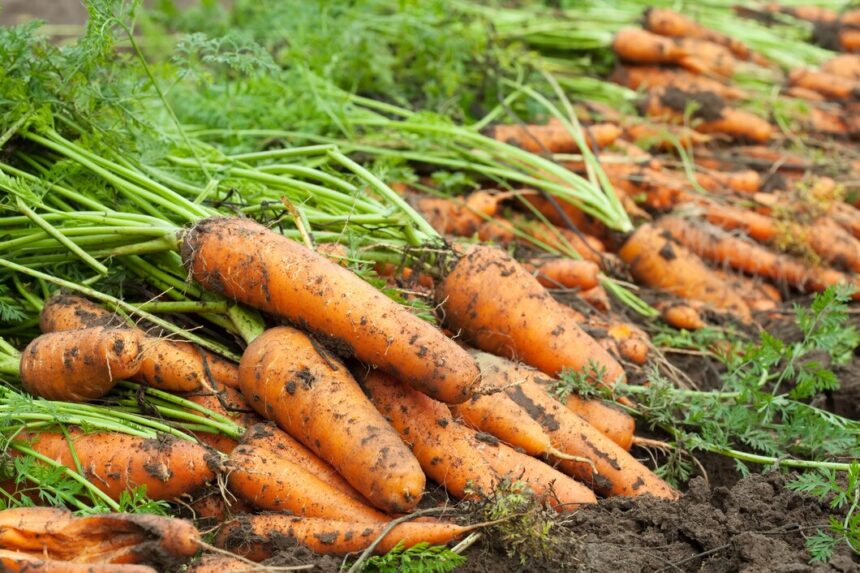Carrots, with their vibrant color and sweet flavor, are a beloved vegetable in gardens around the world. However, achieving optimal growth and quality requires attention to proper nutrient balance, including potassium. Potassium is essential for carrot development, influencing root growth, water uptake, and overall plant health. Here are 10 early signs that your carrots may need more potassium:
- Stunted Growth: If your carrot plants appear smaller than expected or fail to reach their typical size, it could indicate insufficient potassium. Potassium deficiency can hinder cell expansion and overall plant growth, leading to stunted development.
- Yellowing Leaves: Carrot plants deficient in potassium may exhibit yellowing or chlorosis of older leaves, starting from the tips and edges and progressing inward. Potassium is crucial for chlorophyll synthesis, and its deficiency can impair photosynthetic activity, resulting in leaf discoloration.
- Leaf Curling: Curling or cupping of carrot leaves, especially along the margins, can be a sign of potassium deficiency. Potassium helps regulate water balance within plant cells, and inadequate levels can disrupt cell turgor pressure, leading to leaf deformation.
- Weak Stems: Carrot plants lacking potassium may develop weak and brittle stems that are unable to support the weight of the foliage and developing roots. Potassium plays a role in cell wall formation and strength, contributing to plant structural integrity.
- Poor Root Development: Insufficient potassium can impair root growth and development in carrots, resulting in smaller, misshapen, or forked roots. Potassium is essential for nutrient uptake and translocation within the plant, and its deficiency can hinder root expansion and elongation.
- Increased Susceptibility to Pests and Diseases: Potassium-deficient carrot plants may be more susceptible to pest infestations and diseases. Potassium plays a role in plant defense mechanisms, and its deficiency can weaken the plant’s ability to resist insect pests and pathogens.
- Delayed Maturity: Carrots lacking adequate potassium may take longer to reach maturity, prolonging the time from sowing to harvest. Potassium influences various physiological processes, including flowering and fruiting, and its deficiency can delay the development of mature carrots.
- Bitter or Off-Flavors: Potassium deficiency can impact the flavor and quality of carrots, resulting in bitterness or off-flavors in the roots. Potassium is involved in sugar metabolism and accumulation, and its deficiency can alter the balance of sugars and organic acids in carrots, affecting taste.
- Poor Tolerance to Environmental Stress: Carrot plants deficient in potassium may exhibit poor tolerance to environmental stressors such as drought, heat, or cold. Potassium helps regulate osmotic potential and water relations within plant cells, and its deficiency can compromise the plant’s ability to withstand adverse conditions.
- Generalized Symptoms: In severe cases of potassium deficiency, carrot plants may exhibit generalized symptoms of nutrient stress, including overall wilting, leaf necrosis, and poor overall vigor. These symptoms may indicate advanced stages of deficiency and require immediate corrective action.
If you observe any of these early signs of potassium deficiency in your carrot plants, it’s essential to take corrective measures promptly to ensure optimal growth and yield. Incorporating potassium-rich fertilizers or organic amendments into the soil, adjusting pH levels, and practicing crop rotation can help address potassium deficiencies and promote healthy carrot production in your garden. Regular soil testing and monitoring of plant health are essential for maintaining optimal nutrient balance and maximizing crop performance. By addressing potassium deficiencies early, you can ensure a bountiful harvest of delicious, vibrant carrots from your garden.
Join 'Farmers Mag' WhatsApp Channel
Get the latest Farming news and tips delivered straight to your WhatsApp
CLICK HERE TO JOIN






